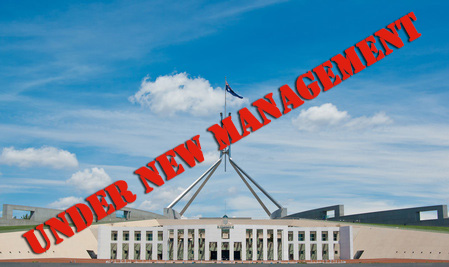Here at SQHQ — as with all of those supporting alternative energy — we’re surveying the damage after the Coalition’s expected yet stunning landslide win on Saturday night. Both the Liberals and Nationals took a slash and burn approach to solar power in Australia and the whole renewable energy sector during the campaign. This approach included policy announcements such as the gutting of ARENA and the end of the Clean Energy Finance Corporation and “Sloppy” Joe and his finance mates have given no inkling of changing their minds on this all important issue. See last week’s article for more details.
However before we start circling the wagons and filling the moats to prepare ourselves for the expected onslaught, perhaps its time for solar energy fans to look at the positives. I know many of you will be thinking your correspondent has finally taken leave of his senses here but bear with me, there are some good things to be sifted from the wreckage, though you may have to look carefully!
Firstly as discussed in previous articles the overwhelming mandate handed to the Coalition at least ensures a form of stability (at least at the federal level). This has been lacking as solar investors close the purse strings while they await the result of the election. Gone is the previous confusion over Government policy on renewable energy, as we can be fairly sure that incentives such as the carbon tax, federal funding for renewables agencies will be slashed in favour of a more market-based approach.
So where’s the positive in all this I hear you say (yell)? Well the argument being tentatively developed here around the SQHQ water cooler is a variation of the one we’ve been calling for for a number of years. That of giving investors, including small time investors, a degree of certainty in the solar marketplace. A level playing field if you like to allow them to make long term decisions about investments in solar power. Australia’s renewable energy sector may well benefit from this surety.
Secondly the next three years will show how well alternative energy such as solar has grown. More importantly it will show that that it doesn’t need the full time support of governments and can more or less take care of itself in the market place. This may surprise, even shock, those in the more traditional areas of energy extraction.
The sector may well show that it is unstoppable despite the best efforts of any policies that could be conceived as being anti renewables. New developments and breakthroughs in technology appear to occur on a weekly basis. The latest example of this comes from China, our very pro-solar energy neighbours to the North.
A September 3 press release from China Sunergy (AKA CSun) has announced the successful development of a new generation of high-efficiency mono-crystalline solar cells. “New generation” sounds impressive and it is. The company claims a Usain Bolt-esque 20.26% conversion efficiency with these solar cells which gets the coveted nod of approval from the Fraunhofer Institute for Solar Energy Systems ISE, the largest solar research institute in Europe.
CSun’s competitor, Sunpower may have already cracked the 20% efficiency barrier for a solar cell a couple of years ago, but those Sunpower panels have always been jolly expensive compared to most of the competition. The fact that a Tier 1 Chinese manufacturer has cracked 20% can only push prices of the most efficient solar panels, down, down, down.
These breakthroughs and other similar advancements are being made at lightning speed in the solar energy sector as well with big contributions in high efficient solar cells coming from research institutions in our own sunburned land. This combined with the public’s interest to be a part of the solar revolution in Australia including the take up of domestic solar systems — even in the face of state government slashing of feed-in tariffs — means solar energy and renewable energy is here to stay in Australia.
So will the Australian solar industry be able to survive a Coalition government? Will renewables in general flourish under an Abbott-led government? We believe so but what do you think? Do you agree or do you think we’re talking out of our inverters again? Your thoughts (as always) are most welcome below or over at our Facebook Page.


 RSS - Posts
RSS - Posts



Actually I don’t know that much will change. Given their own way, LNP gubmunts would certainly attempt to remove obstacles that impede their profit taking from the energy industry, they certainly won’t encounter a compliant Senate whether immediately or after July 2014. Whilst the Wacky Wabbott would probably love to wade in guns & all (a la General Disaster & his untrustworthy sidekick McArdle), it looks like the Senate will be composed of some very interesting folk, precious few of whom have any respect for lying rodents & duplicitious media moguls. I’m still hoping the fish & chip lady gets up as she has a long outstanding bone to pick with the Mad Monk. Even if not, I’m confident that the brick with eyes will be instructed to look after her interests 🙂 🙂 :).
It seems certain to me that home installations of solar panel systems are about to die a death here in Australia!!! Government incentives were the only thing keeping the installation of private systems alive. What needs to happen, in my opinion, is a better compensation by the Generation Companies for feed-in tariffs. Government incentives, at best, cannot and should not be permanent. The incentives should be provided from the people who are making the profits from feed-ins ie. the Generating Companies. The ridiculous amount they provide at the moment is ludicrous!
I have just returned from a trip to Europe and stayed mainly in Belgium. The feed in tariffs there are practically on a 1-1 basis albeit with a little Governmental help. My son-in-law has a 3KW system installed and his power bills have been reduced to a quarter of what they were previously. Notwithstanding they get much less sunshine compared to Australia!!
Profit-making by the Power Generating Companies will be the root cause of the death of private solar systems!!
Reg Hodges
Nice call folks! I guess, as the time-worn phrase goes, only time will tell.
There is no doubt that Wacky Wabbott & friends would dearly love to destroy the PV industry as it interferes with their profit-taking and that of their avaricious mates running Origin, AGL etc. Getting stuff past the senate however won’t be a walk in the park. Until June 2014 the Greens are likely to block anything they don’t like, and from July 2014 it will be even more interesting with a mix of folk, most of whom aren’t members of the LNP fan club.
Feed in tariffs and rebates aside, there are still 2 very good, and related reasons for installing solar:
1. The price of electricity will always rise.
2, Every kilowatt of power that you generate and use in your home, is a kilowatt you don’t have to buy from a greedy retailer.
There will always come a time when a solar system reaches the point where it has saved the equivalent amount of money to what was spent on the install, but this lenght of time will now be greatly influenced by self consumption patterns.
With this in mind, it has never been more important to ensure that you are buying quality that will last.
It looks like on the level market playing field where current cost of power from grid is being not transparently hiked on the one hand and market costs of alternative energy are close to parity, then ‘rebate’ is more or less not a factor on future uptake, and will probably accelerate, which is a good thing.
Feed in tariff may always be below supply cost on market principles, but probably should now be described as ‘energy infrastructure cost margin adjustment’, it would be nice if the value of this to the grid were quantified transparently. Hopefully soon it will be easier and cost parity to consider micro grid capacitance/storage, and as more go off grid, the overhead wires will be slowly reeled in, and this may very well be a good thing. Just need to watch out for the last flick of the tail of the dying dinosaur. In a more clever world this could all be done in a much more intelligent way.
the rip off is blatantly obvious. we buy a delivered item for a set price we have no control over but we are forced to sell our same product for a price we have no control over either. aside from the fact these systems prop up the expense of delivering the product especially on long radial feeder power lines. a similarity would a booster pump on a long water pipe to assist with line friction.
In my world I took things into hand with the purchase of 6x 200watt panels & 6×200 a/h 12v batteries. I had an inverter a1000 24v santech. This was all paid for by me with no government subsidies & it was reasonable. The object was to reduce power bills to an affordable level. I purchased another inverter a 3000/24v to power the computer & tv (sine wave). My last bill was $90 down from $110. I don’t really want to disconnect from the grid as I do run an air compressor & an electric welder (stick welder) I live in a fully built up area on the far north coast & I don’t have black-outs any more.
Interesting. I’ve recently done something vaguely to supplement my 12.5kw panel / 10kw inverter grid system. In this case I got 12 x 170 watt panels, 4 x 280ah batteries and 3kw inveerter. Idea is that computers. TV, lights & maybe fridge and freezer can run off grid, allowing me to flog the whole output of the grid system to AGL. As I’m in Queensland I expect around $2500 per quarter rebate which will pay for more champagne & lattes than I could ever drink (that will probably be lost on anyone in Mexican states, but derives from a dig at evil solar people by state treasurer Knuckles)